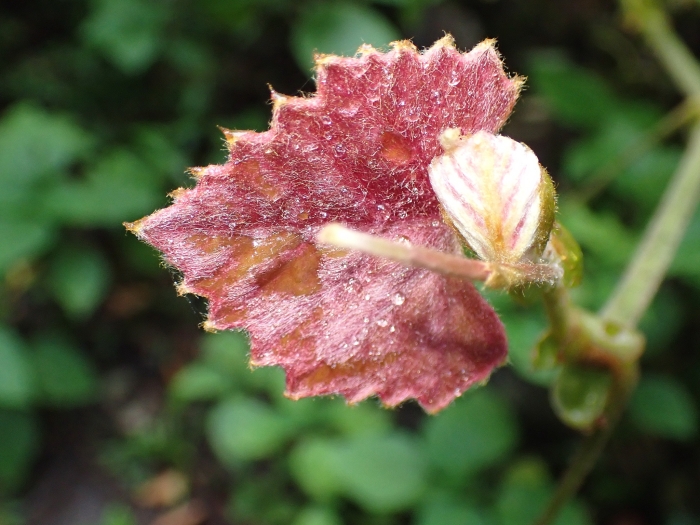Cape Grape
(Rhoicissus tomentosa)
Cape Grape (Rhoicissus tomentosa)
/
/

Di Turner
Public Domain
Image By:
Di Turner
Recorded By:
Copyright:
Public Domain
Copyright Notice:
Photo by: Di Turner | License Type: Public Domain | License URL: http://creativecommons.org/publicdomain/zero/1.0/ | Rights Holder: Di Turner | Publisher: iNaturalist | Date Created: 2021-02-12T09:37:53-08:00 |



















































Estimated Native Range
Summary
Rhoicissus tomentosa, commonly known as Cape Grape, is a vigorous, evergreen vine native to the afro-montane forests of southern Africa, including South Africa, Zimbabwe, and Eswatini. This species thrives in the dense, humid environments of forest canopies, where it can reach great heights by climbing trees and other structures. It typically exhibits a lush, dense growth habit, making it an attractive and popular creeper. The vine’s large, simple, roughly circular leaves are a deep green on the upper surface and soft and velvety below, adding to its ornamental value. Cape Grape is notable for its velvety new shoots and mature stems that hang like ropes from the canopy.
Cape Grape blooms in summer, producing clumps of furry flower buds that open into small, inconspicuous flowers. These are followed by bunches of dark purple, edible, grape-like berries that can be used to make a flavorful jam. The plant’s evergreen foliage, with its even, multi-colored appearance, is particularly ornamental throughout the year. In cultivation, Cape Grape is versatile, serving as a ground cover in shady areas, a wall climber with trellis support, a screen or hedge when trained over fences, and even as material for wire-basket topiaries. It is well-suited for African gardens as a local alternative to ivy. Cape Grape requires full sun or part shade, medium to high water availability, and soils with medium drainage for optimal growth. While it is generally easy to maintain, it can become too vigorous in some settings, requiring regular pruning to control its spread.CC BY-SA 4.0
Cape Grape blooms in summer, producing clumps of furry flower buds that open into small, inconspicuous flowers. These are followed by bunches of dark purple, edible, grape-like berries that can be used to make a flavorful jam. The plant’s evergreen foliage, with its even, multi-colored appearance, is particularly ornamental throughout the year. In cultivation, Cape Grape is versatile, serving as a ground cover in shady areas, a wall climber with trellis support, a screen or hedge when trained over fences, and even as material for wire-basket topiaries. It is well-suited for African gardens as a local alternative to ivy. Cape Grape requires full sun or part shade, medium to high water availability, and soils with medium drainage for optimal growth. While it is generally easy to maintain, it can become too vigorous in some settings, requiring regular pruning to control its spread.CC BY-SA 4.0
Plant Description
- Plant Type: Vine
- Height: 10-15 feet
- Width: 2-3 feet
- Growth Rate: Moderate
- Flower Color: N/A
- Flowering Season: Summer
- Leaf Retention: Evergreen
Growth Requirements
- Sun: Full Sun, Part Shade
- Water: Medium, High
- Drainage: Medium
Common Uses
Low Maintenance, Potted Plant, Rock Garden
Natural Habitat
native to the afro-montane forests of southern Africa, including South Africa, Zimbabwe, and Eswatini
Other Names
Common Names: Kapcissus
Scientific Names: , Cissus capensis, Rhoicissus capensis, Rhoicissus tomentosa, Cissus tomentosa, Cissus dregeana, Vitis capensis,
GBIF Accepted Name: Rhoicissus tomentosa (Lam.) Wild & R.B.Drumm.